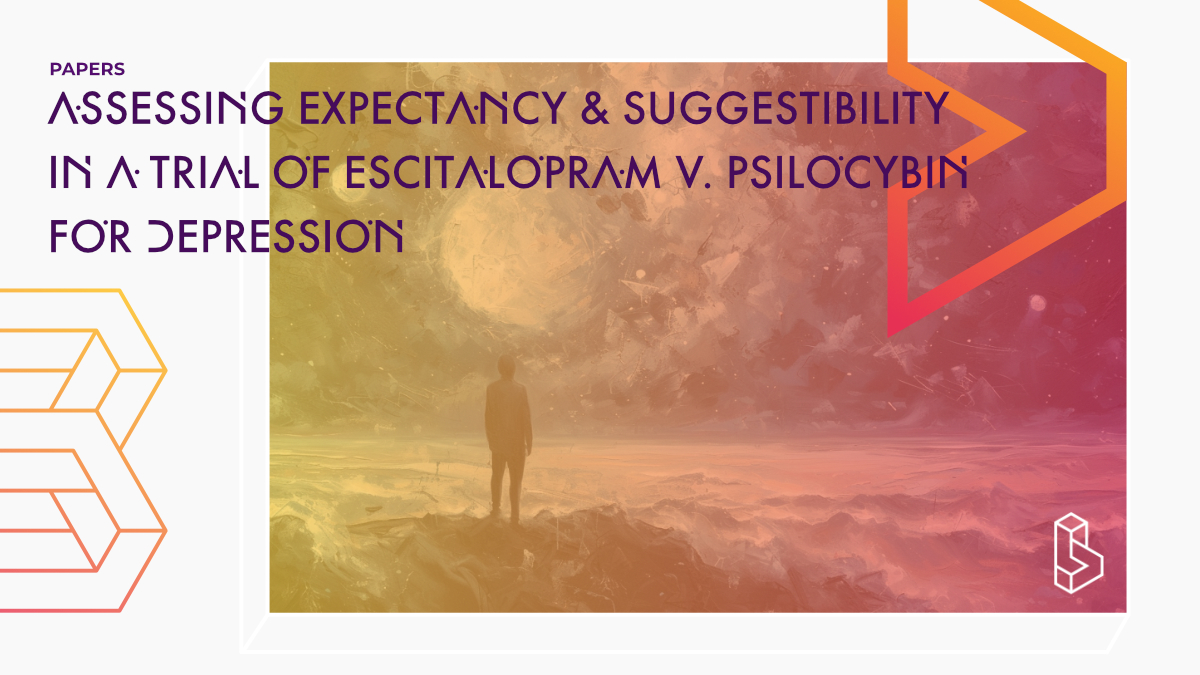This reanalysis of an RCT (n=55) compared escitalopram and psilocybin (COMP360) for treating depression (MDD). Patients had higher expectancy for psilocybin, but only expectancy for escitalopram predicted therapeutic outcomes. Additionally, pre-treatment trait suggestibility was associated with therapeutic response in the psilocybin arm, suggesting psychedelic therapy may be less vulnerable to expectancy biases, and highly suggestible individuals may be primed for response to psilocybin treatment.
Abstract of Assessing expectancy and suggestibility in a trial of escitalopram v. psilocybin for depression
“Background To investigate the association between pre-trial expectancy, suggestibility, and response to treatment in a trial of escitalopram and investigational drug, COMP360, psilocybin, in the treatment of major depressive disorder.
Methods We used data (n = 55) from our recent double-blind, parallel-group, randomized head-to-head comparison trial of escitalopram and investigational drug, COMP360, psilocybin. Mixed linear models were used to investigate the association between pre-treatment efficacy-related expectations, as well as baseline trait suggestibility and absorption, and therapeutic response to both escitalopram and COMP360 psilocybin.
Results Patients had significantly higher expectancy for psilocybin relative to escitalopram; however, expectancy for escitalopram was associated with improved therapeutic outcomes to escitalopram, expectancy for psilocybin was not predictive of response to psilocybin. Separately, we found that pre-treatment trait suggestibility was associated with therapeutic response in the psilocybin arm, but not in the escitalopram arm.
Conclusions Overall, our results suggest that psychedelic therapy may be less vulnerable to expectancy biases than previously suspected. The relationship between baseline trait suggestibility and response to psilocybin therapy implies that highly suggestible individuals may be primed for response to this treatment.”
Authors: Balázs Szigeti, Brandon Weiss, Fernando E. Rosas, David Erritzoe, David J. Nutt & Robin L. Carhart-Harris
Summary of Assessing expectancy and suggestibility in a trial of escitalopram v. psilocybin for depression
Depression affects 400 million people globally, and mental illness is forecasted to be the leading contributor to the global burden of disease by 2030. Psychedelic-assisted therapy is a promising new treatment for depression that uses psychedelics to interact positively with psychotherapeutic processes.
Recently, the authors conducted a head-to-head comparative trial of escitalopram vs investigational psilocybin therapy for the treatment of depression. Psilocybin therapy was superior by a greater than 95% confidence margin on all mental-health-related secondary outcomes.
Patient expectations can influence therapeutic outcomes, and effective blinding is difficult to achieve in practice. In addition, expectancy effects may be influencing the observed results in psychedelic trials, and a need to investigate expectancy and related effects in all psychedelic trials.
Methods
Find this paper
Assessing expectancy and suggestibility in a trial of escitalopram v. psilocybin for depression
https://doi.org/10.1017/s0033291723003653
Paywall | Google Scholar | Backup | 🕊
Cite this paper (APA)
Szigeti, B., Weiss, B., Rosas, F. E., Erritzoe, D., Nutt, D., & Carhart-Harris, R. (2024). Assessing expectancy and suggestibility in a trial of escitalopram v. psilocybin for depression. Psychological Medicine, 1-8.
Study details
Compounds studied
Psilocybin
Topics studied
Depression
Study characteristics
Original Re-analysis
Placebo-Controlled
Active Placebo
Double-Blind
Randomized
Re-analysis
Participants
55
Humans
Institutes
Institutes associated with this publication
Imperial College LondonThe Centre for Psychedelic Research studies the action (in the brain) and clinical use of psychedelics, with a focus on depression.
Compound Details
The psychedelics given at which dose and how many times
Psilocybin 25 mg | 2xLinked Research Papers
Notable research papers that build on or are influenced by this paper
Trial of Psilocybin versus Escitalopram for DepressionThis double-blind placebo-controlled study (n=59) compared psilocybin (2x25mg; 3 weeks apart) to escitalopram (SSRI) over a six-week period and found large improvements in depression scores for those suffering from depression (MDD) in both groups. On the main measure of depression, the QIDS-SR-16, there was no significant difference between both groups. The study did find significant differences, favoring psilocybin, on the HAM-D-17, MADRS, avoidance, flourishing, wellbeing, and suicidality.
Linked Clinical Trial
Psilocybin vs Escitalopram for Major Depressive Disorder: Comparative MechanismsThis is a randomised double-blind clinical trial. The aim is to compare the efficacy and mechanisms of action of psilocybin, the primary psychoactive substance in 'magic mushrooms', with the SSRI (selective serotonin reuptake inhibitor) escitalopram for major depressive disorder (MDD).

